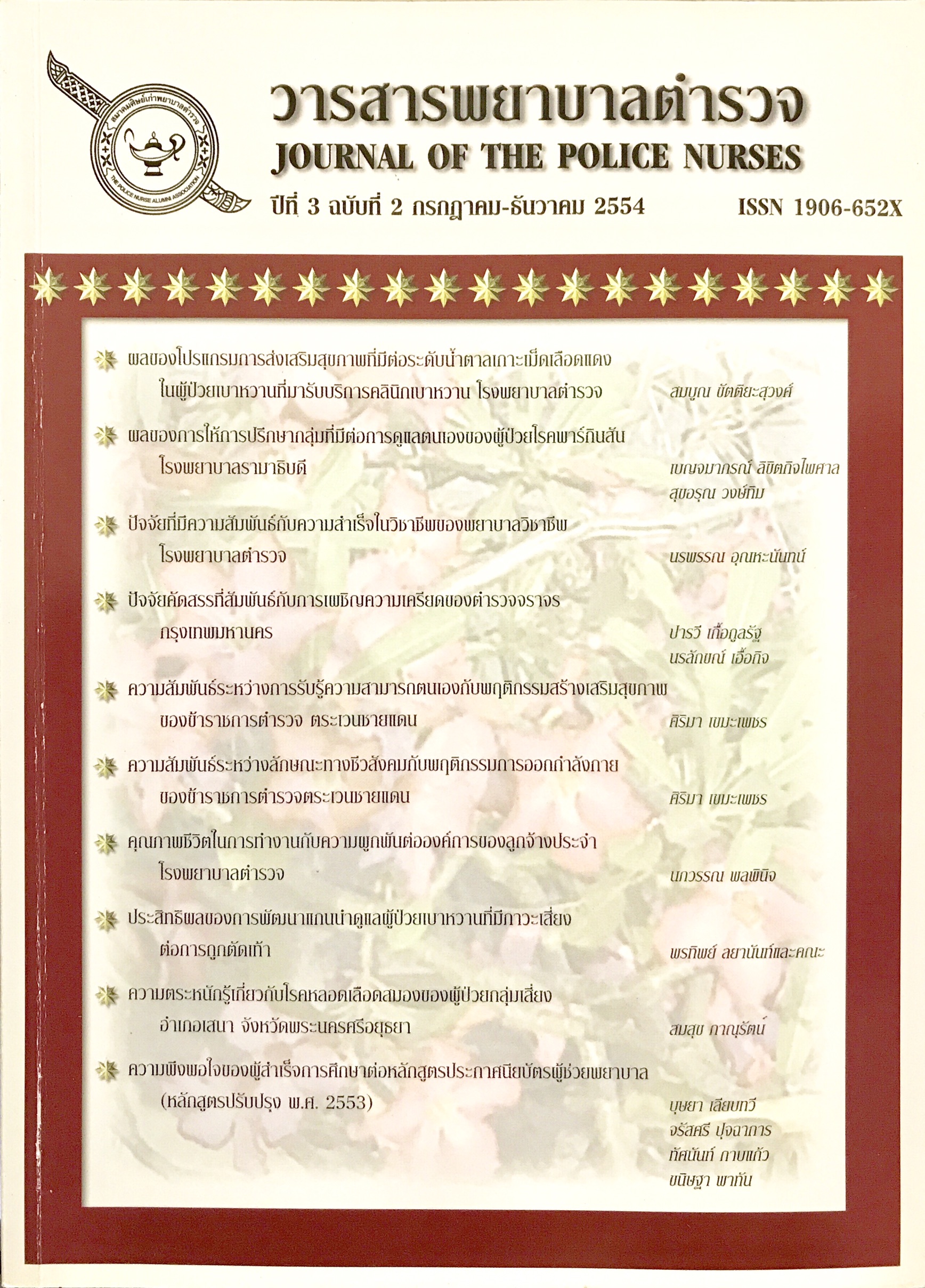ความสัมพันธ์ระหว่างลักษณะทางชีวสังคมกับพฤติกรรมการออกกำลังกายของข้าราชการตำรวจตระเวนชายแดน
Keywords:
ลักษณะทางชีวสังคม, พฤติกรรมการออกกำลังกาย, Sociodemographic factors, exercise behaviorAbstract
บทคัดย่อ
คนเราเมื่ออายุมากขึ้นอวัยวะในร่างกายจะค่อย ๆ เสื่อมหน้าที่ทำให้มีการเจ็บป่วยเพิ่มมากขึ้น การออกกำลังกายเป็นวิธีหนึ่งที่จะช่วยส่งเสริมให้มีสุขภาพดี จากรายงานการตรวจสุขภาพประจำปี พบว่า ข้าราชการตำรวจส่วนใหญ่ป่วยเป็นโรคความดันโลหิตสูง เบาหวาน ไขมันในเลือดสูง โรคอ้วน หรือ กรดยูริคในกระแสเลือดสูง โรคเหล่านี้ล้วนมีสาเหตุมาจากพฤติกรรมเกือบทั้งสิ้น ข้อมูลความสัมพันธ์ระหว่างลักษณะทางชีวสังคมกับพฤติกรรมการออกกำลังกายในข้าราชการตำรวจยังมีน้อย การศึกษานี้มีวัตถุประสงค์เพื่อศึกษาความสัมพันธ์ระหว่างลักษณะทางชีวสังคมกับพฤติกรรมการออกกำลังกายของข้าราชการตำรวจตระเวนชายแดน กลุ่มตัวอย่างที่ศึกษาครั้งนี้ ได้แก่ ข้าราชการตำรวจตระเวนชายแดน จำนวน 389 คน ที่เข้ารับการอบรมโครงการตำรวจไทยไร้พุง คัดเลือกกลุ่มตัวอย่างโดยวิธีแบบเจาะจง (Purposive sampling) ร่วมกับความสมัครใจของผู้เข้าร่วมโครงการ เก็บข้อมูลโดยใช้แบบสอบถาม สำหรับความดันโลหิต รอบเอว นํ้าหนักตัว ผู้วิจัยดำเนินการตรวจวัดในวันอบรม ส่วนสูงได้จากการซักถาม สถิติที่ใช้เป็นสถิติเชิงพรรณนาได้แก่ ค่าเฉลี่ยเลขคณิต ค่าเบี่ยงเบนมาตรฐาน และร้อยละ การหาความสัมพันธ์ระหว่างลักษณะทางชีวสังคมกับพฤติกรรมการออกกำลังกายใช้ค่าสัมประสิทธิ์สหสัมพันธ์ของเพียร์สัน (Pearson’s product moment correlation coefficient) ที่ระดับนัยสำคัญทางสถิติ .05 ผลการศึกษา พบว่า ความดันโลหิต ดัชนีมวลกาย รอบเอว และระดับการศึกษามีความสัมพันธ์ทางบวกกับพฤติกรรมการออกกำลังกายอย่างมีนัยสำคัญทางสถิติ (r=0.16, 0.16, 0.18, 0.16 ตามลำดับ, p<.01) สำหรับตัวแปรลักษณะทางชีวสังคมอื่นไม่มีความสัมพันธ์ทางสถิติกับพฤติกรรมการออกกำลังกาย นั่นคือ ข้าราชการตำรวจตระเวนชายแดนยังไม่เห็นความสำคัญของการออกกำลังกายอาจเป็นเพราะความเจ็บป่วยไม่ส่งผลกระทบต่อการปฏิบัติงาน ยังสามารถใช้ชีวิตเช่นคนปกติได้ ก็อาจยังไม่ต้องมีการดูแลสุขภาพของตนเอง เช่น การออกกำลังกาย ถ้าสุขภาพของตนเองเริ่มไม่ค่อยดีก็อาจคิดเริ่มดูแลสุขภาพมากขึ้นโดยการออกกำลังกาย ดังนั้น จึงควรส่งเสริมให้ข้าราชการตำรวจทุกคนมีความตระหนักการดูแลสุขภาพของตนเองโดยไม่ต้องคำนึงสภาวะสุขภาพของตนเอง
The Relationship between Sociodemographic Factors and Exercise Behavior among Border Patrol Police
Abstract
Aging is one of the main causes of gradual organ dysfunction in all primates, including humans. Exercise is a modality to promote good health and slow the advance of organ dysfunction. Based on annual check up reports, the majority of police personnel have health problems regarding hypertension, diabetes, dyslipedemia, obesity, or hyperuricemia, likely resulting from inappropriate life style choices. However, there is little known about the association between sociodemographic and exercise behavior among police. The objective of this study was to examine the correlation between sociodemographic factors and exercise behavior among the police personnel in rural areas of Thailand. A total of 389 police personnel who participated in “Thai police anti-obesity project” training were recruited as volunteers for the study using purposive sampling technique. On the day of the training program, the trainees’ blood pressure, waist circumference and weight were measured. A questionnaire was used to collect the other important data. Mean, standard deviation and percentage were performed for the descriptive variables. Pearson’s product moment correlation coefficient was used to analyze the correlation between sociodemographic factors and exercise behavior. The statistical difference was less than 0.05. The results show that there were statistically significant differences at the positive between sociodemographic factors, particularly blood pressure, body mass index, waist circumference and exercise behavior (r= 0.16, 0.16, 0.18, 0.16 respectively p< 0.01) and there was no significant difference for the other variables. According to our study, police personnel in the rural areas of Thailand who had existing health problems should be more concerned about their life style regarding exercise behavior than those without existing health problems; however, living a healthy life style should be promoted among all police personnel regardless of their health status.
Downloads
Downloads
How to Cite
Issue
Section
License
ผลงานที่ได้ตีพิมพ์แล้วจะเป็นลิขสิทธิ์ของวารสารพยาบาลตำรวจ















